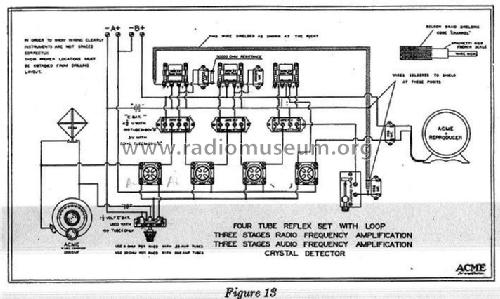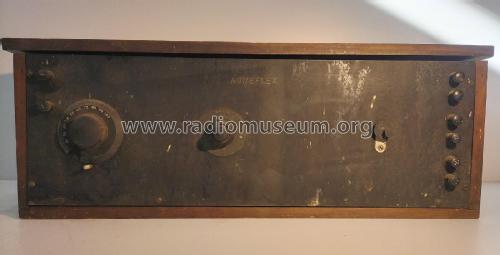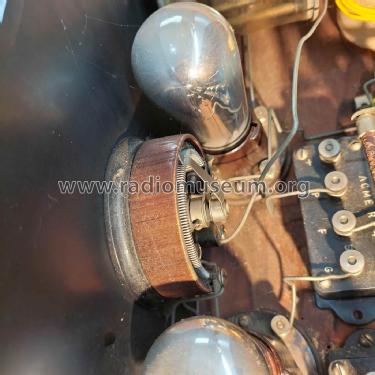Acmeflex Model A
Acme Apparatus Co.; Cambridge (MA)
- Country
- United States of America (USA)
- Manufacturer / Brand
- Acme Apparatus Co.; Cambridge (MA)
- Year
- 1925 ?
- Category
- Kit (Parts plus instruction) or building instructions only
- Radiomuseum.org ID
- 336932
Click on the schematic thumbnail to request the schematic as a free document.
- Number of Tubes
- 4
- Main principle
- Special principle (see notes); 3 AF stage(s); Reflex
- Wave bands
- Broadcast only (MW).
- Power type and voltage
- Storage and/or dry batteries / 90; 6; 4.5 Volt
- Loudspeaker
- - This model requires external speaker(s).
- Material
- Wooden case
- from Radiomuseum.org
- Model: Acmeflex Model A - Acme Apparatus Co.; Cambridge
- Shape
- Tablemodel, Box - most often with Lid (NOT slant panel).
- Notes
-
Radio is unique because of its reflex design, single tuned stage, and panel-mounted crystal detector. The radio must be connected to a loop antenna to complete the tuned circuit. Selectivity is poor, but would have been adequate in 1925. If a tuned loop is used, the radio can be tuned across most of the AM band with much better selectivity. Rheostat controls filaments of all 4 tubes. Potentiometer controls bias on first tube grid. Acme put the rheostat and pot in a concentric arrangement. The crystal detector has a coarse adjustment and a small vernier to help move the internal cat whisker. This detector works very well and once set it requires very little attention. It was in a cheaply made pine box with a plain bakelite front panel. It was intended to be low cost compared to other radios at that time, but still provides adequate sensitivity and enough power to clearly drive a horn or loudspeaker of that time.
Everything in the Kit except tubes, batteries and speaker.
- Source of data
- Radio Collector`s Guide 1921-1932
- Literature/Schematics (1)
- -- Schematic
- Author
- Model page created by Tim McVey. See "Data change" for further contributors.
- Other Models
-
Here you find 21 models, 20 with images and 5 with schematics for wireless sets etc. In French: TSF for Télégraphie sans fil.
All listed radios etc. from Acme Apparatus Co.; Cambridge (MA)
Collections
The model Acmeflex is part of the collections of the following members.





















